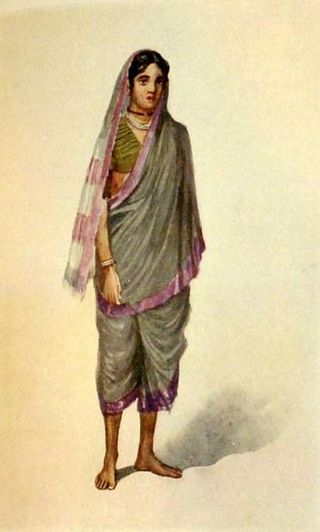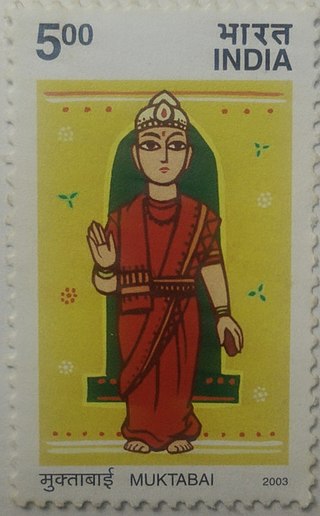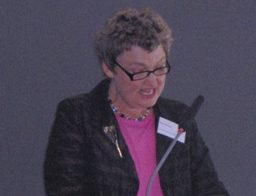Related Research Articles

Akka Mahadevi ಅಕ್ಕ ಮಹಾದೇವಿ (c.1130–1160) was one of the early female poets of the Kannada literature and a prominent person in the Lingayat Shaiva sect in the 12th century. Her 430 extant Vachana poems, and the two short writings called Mantrogopya and the Yogangatrividh are considered her most notable contribution to Kannada literature. She composed fewer poems than other saints of the movement. The term Akka is an honorific given to her by great Lingayat saints such as Basavanna, Siddharama and Allamaprabhu and an indication of her high place in the spiritual discussions held at the "Anubhava Mantapa". She is seen as an inspirational woman in Kannada literature and in the history of Karnataka. She considered the god Shiva as her husband,.

"The Second Nun's Tale", written in late Middle English, is part of Geoffrey Chaucer's The Canterbury Tales. Narrated by a nun who remains unnamed, it is a hagiography of the life of Saint Cecilia.

Andal, also known as Kothai, Nachiyar, and Godadevi, was the only female Alvar among the twelve Hindu poet-saints of South India. She was posthumously considered an avatar of the goddess Bhudevi. As with the Alvar saints, she was affiliated with the Sri Vaishnava tradition of Hinduism. Active in the 8th-century, with some suggesting 7th-century, Andal is credited with two great Tamil works, Thiruppavai and Nachiyar Tirumoḻi, which are still recited by devotees during the winter festival season of Margaḻi. Andal is a prominent figure for women in South India and has inspired several women's groups such as Goda Mandali.

Mahar, meaning "original inhabitants of Maharashtra", is an Indian caste found largely in the state of Maharashtra and neighbouring areas. Most of the Mahar community followed B. R. Ambedkar in converting to Buddhism in the middle of the 20th century. As of 2017 the Mahar caste was designated as a Scheduled Caste in 16 Indian states.
The caste system in Kerala differed from that found in the rest of India. While the Indian caste system generally divided the four-fold Varna division of the society into Brahmins, Kshatriyas, Vaishyas and Shudras, in Kerala, that system was absent. The Malayali Brahmins formed the priestly class, and they considered all other castes to be either Shudra or Avarna.

Chokhamela was a Hindu saint in Maharashtra, India in the 14th century. He belonged to the Mahar caste,, which was considered that time one of the untouchable castes in India. He was born at Mehuna Raja, a village in Deulgaon Raja Taluka of Buldhana district. He lived at Mangalvedha in Maharashtra. He wrote many Abhangas. One of his famous Abhangas is 'Abir Gulal Udhlit Rang". He was one of the first low-cast poets in India.
Soyarabai Bhosale(née Mohite) was second wife of Chatrapati Shivaji Maharaj, the founder of Maratha empire in western India. She was mother of Chatrapati Shivaji Maharaj second son, Rajaram. She was the younger sister of Maratha army chief Hambirrao Mohite.
Sant Janābāi was a Marāthi religious poet in the Hindu tradition in India, who was born likely in the seventh or the eighth decade of the 13th century. She died in 1350.

Nandanar, also known as Tirunalaippovar and Tiru Nalai Povar Nayanar, was a Nayanar saint, who is venerated in the Hindu sect of Shaivism. He is the only Dalit ("untouchable") saint in the Nayanars. He is generally counted as the eighteenth in the list of 63 Nayanars. Like the other Nayanars, he was a devout devotee of the god Shiva.
Bahinabai or Bahina or Bahini is a Varkari female-saint from Maharashtra, India. She is considered as a disciple of another Varkari poet-saint Tukaram. Having been born in a Brahmin family, Bahinabai was married to a widower at a young age and spent most of her childhood wandering around Maharashtra along with her family. She describes, in her autobiography Atmamanivedana, her spiritual experiences with a calf and visions of the Varkari's patron deity Vithoba and Tukaram. She reports being subjected to verbal and physical abuse by her husband, who despised her spiritual inclination but who finally accepted her chosen path of devotion (bhakti). Unlike most female-saints who never married or renounced their married life for God, Bahinabai remained married her entire life.

Kanhopatra was a 15th-century Marathi saint-poet, venerated by the Varkari sect of Hinduism.

Muktabai or Mukta was a saint in the Varkari Movement. She was born in a Deshastha Brahmin family and was the younger sister of Dnyaneshwar, the first Varkari saint. She wrote forty-one abhangs throughout her life.

Margit Warburg is a Danish sociologist of religion. Since 2004, she has been professor of Sociology of Religion in the Department of Cross-Cultural and Regional Studies at the University of Copenhagen. She was an associate professor at the same university from 1979 to 2004.
Sant Karmamela was a fourteenth-century poet saint from Maharashtra. He was a son of Chokhamela and Soyarabai who belonged Mahar caste. In his Abhangs he accused God for forgetting and how his life was made miserable as a low caste. He rebelled against varna system.
Sant Nirmala was a poet in 14th-century Maharashtra, India. As the younger sister of Chokhamela, she was deemed equally holy with her brother and thus is also deemed a Hindu saint. Nirmala was married to Banka, of the Untouchable Mahar caste. Her writings consist largely of abhangs that describe the injustice and inequalities she suffered as a result of the caste system.
Sant Banka also known as Wanka was a poet in 14th century Maharashtra, India. He was husband to Nirmala and brother-in-law to Chokhamela. Born in Mehenpuri, Banka was a member of the Mahar caste. In most of his abhangs he praised Vitthal in happiness and peace. Infrequently, he described his lower caste birth.
Bhagu was a Bhakti movement poet. She belonged to the Mahar caste. Little is known about her. In the Shrisakalsantgatha she is called "Bhagu Maharin".
The Gurav are an occupational community comprising several castes. They are among the traditional service providers found in villages, for whom they act in a priest role, and are found in several states of India.
Elisabeth Christine Berling (1744-1801) was a Danish businessperson.
References
- 1 2 3 4 Stewart-Wallace, editorial advisers Swami Ghananda, Sir John (1979). Women saints, east & west (1. U.S. ed.). Hollywood, Calif.: Vedanta. p. 61. ISBN 0874810361.
- ↑ Zelliot, Eleanor (2008). "Chokhamela, His Family and the Marathi Tradition". In Aktor, Mikael; Deliège, Robert (eds.). From Stigma to Assertion: Untouchability, Identity and Politics in Early and Modern India. Copenhagen: Museum Tusculanum Press. pp. 76–86. ISBN 978-8763507752.
- ↑ Mikael, Aktor, ed. (2008). From Stigma to Assertion : Untouchability, Identity & Politics in Early & Modern India. Copenhagen: Museum Tusculanum Press. pp. 81–85. ISBN 978-8763507752.